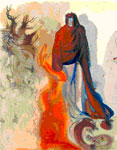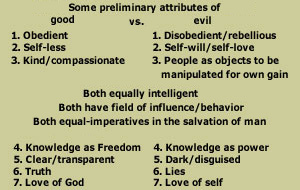 |
 |
Home | Contact |
 |
 |
 |
|
Part VIId You would think mankind had developed beyond the Garden of Eden by now, but we have not. It is still impossible to tell good from evil. Not in the short run where the distinction seems somewhat self-evident, but rather the problem of discernment tends to manifest over a longer period of time. There is nothing more disquieting as a few moments of sincere reflection. How many of us have been able to realize that what seemed to have been a disaster at the time, is now recognizable as having been a blessing in disguise? As long as people remain asleep, they will continue to see the good in themselves and the evil in the "other." It is sobering to realize the fact that not only is there good and evil in everybody, there is also no good or evil beyond human subjectivity. In the Real Objective World, what is, is. To complicate matters even more, there is also a downside of the good as well as an upside of evil. It is not in God's best interest, nor in Mother Nature's best interest, nor in the interest of the Work Itself, that "evil" disappears. Our Holy Father below remains just as much of an existential imperative as does Our Holy Father above. The good, as a moral/spiritual commodity, will always be light, open, warm, trusting and forgiving. The problem is that the good plays by a different set of rules than does evil. The "good" tells the truth. The good aims at perfect understanding; harmlessness, whereas, evil can and does lie, cheat, steal and betray. Evil invariably cheats because evil frequently cannot "win" in any other way. Evil is the source of all useless suffering, pain, and misery that humankind has been heir to. Yet, this sea of human misery has often proven to be the very condition, which has caused a soul to turn around, and begin to work on itself. Misery has oftentimes provided a very fertile ground for the salvation of mankind. Learning how to see and digest the value of "evil" remains one of the hallmarks of spiritual development, whether it be revealed in the quote about Jung, from Marie-Louise Von Franz, or in the list which follows, one can clearly see that learning how to judge good from evil is much more complicated than what one might first imagine. "Jung has said that to be in a situation where there is no way out, or to be in a conflict where there is no solution, is the classical beginning of the process of individuation. It is meant to be a situation without solution: the unconscious wants the hopeless conflict in order to put ego-consciousness up against the wall, so that the man has to realize that whatever he does wrong, whichever way he decides will be wrong. This is meant to knock out the superiority of ego, which always acts from the illusion that is has the responsibility of decision. Naturally, if a man says, "Oh, well, then I shall just let everything go and make no decision, but just protract and wriggled out of (it)," the whole thing is equally wrong, for then naturally nothing happens. But if he is ethical enough to suffer to the core of his personality, then generally…the Self manifests. In religious language you could say that the situation without issue is meant to force the man to rely on an act of God. In psychological language the situation without issue, which the anima arranges with great skill in a man's life, is meant to drive him into a condition in which he is capable of experiencing the Self. When thinking of the anima as the soul guide, we are apt to think of
Just as suffering may lead a lost soul towards salvation, there is another attribute which "appears" to be innocent which when unrecognized leads ever downwards. "Deep in our inner selves there is another evil… this is self-complacency. The vanity of those who are pleased with themselves although they either fail to please others or have no wish to do so and even actively displease them. But though they are pleasing to themselves, they are gravely displeasing to you because they congratulate themselves not only upon qualities, which are not good, but also upon qualities received from you as though they were their own gifts to themselves." St. Augustine Sometimes a sure sign of spiritual development is the ability to go back to the Garden of Eden Within and to start over afresh. Now, after years and years of sincere self-observation, now, after years and years of working upon ones self, now, after years of sacrificing the lower to engender the higher, one becomes able to finally listen as only the dying can and to hopefully avoid eating another apple. |
|
|
|||||||||||||
| Sitemap |
|
|
|
|
|
|
|
|
|
|
|
|
|
|
|
|||||||||||||
© 2006 Sojourner Institute, All rights reserved
 Beatrice leading Dante up to Paradise, but we should not forget that he experienced that only after he had gone through Hell. Normally, the anima does not take a man by the hand and lead him right up to Paradise: she puts him first into a hot cauldron where he is nicely roasted for a while."(* Marie-Louise Von Franz, "Interpretation of Fairy Tales" (New York, Spring Publications, 1970), sec. VI, p.4.)
Beatrice leading Dante up to Paradise, but we should not forget that he experienced that only after he had gone through Hell. Normally, the anima does not take a man by the hand and lead him right up to Paradise: she puts him first into a hot cauldron where he is nicely roasted for a while."(* Marie-Louise Von Franz, "Interpretation of Fairy Tales" (New York, Spring Publications, 1970), sec. VI, p.4.)